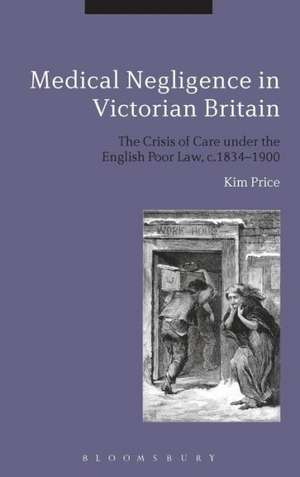Medical Negligence in Victorian Britain: The Crisis of Care under the English Poor Law, c.1834-1900
Autor Kim Priceen Limba Engleză Hardback – 25 feb 2015
| Toate formatele și edițiile | Preț | Express |
|---|---|---|
| Paperback (1) | 257.32 lei 6-8 săpt. | |
| Bloomsbury Publishing – 24 aug 2016 | 257.32 lei 6-8 săpt. | |
| Hardback (1) | 854.87 lei 6-8 săpt. | |
| Bloomsbury Publishing – 25 feb 2015 | 854.87 lei 6-8 săpt. |
Preț: 854.87 lei
Preț vechi: 1112.97 lei
-23% Nou
Puncte Express: 1282
Preț estimativ în valută:
163.59€ • 169.83$ • 136.41£
163.59€ • 169.83$ • 136.41£
Carte tipărită la comandă
Livrare economică 22 martie-05 aprilie
Preluare comenzi: 021 569.72.76
Specificații
ISBN-13: 9781441125460
ISBN-10: 1441125469
Pagini: 248
Dimensiuni: 156 x 234 x 16 mm
Greutate: 0.53 kg
Editura: Bloomsbury Publishing
Colecția Bloomsbury Academic
Locul publicării:London, United Kingdom
ISBN-10: 1441125469
Pagini: 248
Dimensiuni: 156 x 234 x 16 mm
Greutate: 0.53 kg
Editura: Bloomsbury Publishing
Colecția Bloomsbury Academic
Locul publicării:London, United Kingdom
Caracteristici
By focusing on medical negligence, this study fills a gap in scholarship on welfare history
Notă biografică
Kim Price is a Research Fellow with Northumbria University, UK and an Honorary Visiting Fellow with the Centre for Medical Humanities at the University of Leicester, UK. He has been a Wellcome Trust Research Fellow and the winner of several other research funding awards.
Cuprins
FiguresAcknowledgments1. Introduction: The Nuances of Neglect under the New Poor Law Part 12. Victorian 'State Doctors': Medical Officers of the Poor Law 3. Negligence: The 'Psychological Moment'4. Framing and Mapping Negligence under the Poor LawPart 25. A Latent Failure: The Crusade against Outdoor Relief6. Survival of the Fittest: Indoor Neglect7. A Catch-22: Outdoor Neglect8. Conclusion: Seen but not heard? The Patient's voiceNotesBibliographyIndex
Recenzii
Medical Negligence in Victorian Britain demonstrates for the first time the frequency and regularity with which poor law medical officers were charged with neglect ... [and] provides a nuanced history of [their] attempts to reform medical care.
Carefully written and skilfully argued ... Price's book is an important intervention in welfare, poor law and medical history ... There is much to learn in this book.
Medical Negligence in Victorian Britain presents a compelling 'anti-progress' study, which shows the ongoing structural and economic problems that fed into neglect and negligence ... [A] valuable contribution ... [and] a thoroughly researched book.
Kim Price has produced a richly detailed study ... Price should be congratulated for bringing this crisis to light with unprecedented rigor, but the novelty of the work also resides in the way it seeks to explain why and how this crisis came about ...[this is] essential reading for all historians and postgraduate students ... it should also be of interest to contemporary health care practitioners.
This book provides an original contribution that is supported by statistics and case studies.
The history of medical negligence is a subject that has pressing contemporary relevance. Kim Price's Medical Negligence in Victorian Britain is a carefully researched and richly detailed study that will be of interest to historians and practitioners of medicine, ethics, and law. With a focus on the New Poor Law, Price trains a spotlight on the medical mistreatment of some of the most vulnerable members of society, the poorest of the poor. In so doing, he skillfully reinvigorates debates at the intersection of medical and welfare history in a way that invites us to rethink questions of citizenship, patient rights, and the iniquities of health care delivery.
The fascinating story and explanation Kim Price outlines in Medical Negligence in Victorian Britain is set in the dense and intricate matrix of legal, medical, social and political history. Rich in contemporary parallels, stated and unstated, Professor Price offers a fresh, and much needed perspective on important facets of the Poor Law, medical professionalism and medical negligence in late nineteenth century Britain. Along the way Medical Negligence in Victorian Britain explicitly and implicitly illustrates that both medical error and medical neglect can only be accurately and subtly understood when placed full sociological and political context and not merely viewed as isolated individual events involving single physician-patient dyads. Professor Price's work is assiduously researched using both well know and new resources in inventive and striking ways. His analysis is rigorous yet remains readable without sacrificing nuance. Medical Negligence in Victorian Britain stands not only an important adjuvant to existing Poor Law literature, but its erudite and eclectic scope should serve as a model to those attempting to examine legal and medical developments.
This is an excellent, detailed account of what medical negligence under the New Poor Law of 1834 meant theoretically and practically in Victorian Britain. Price draws on socio-legal analysis to show that a surprising number of charges of neglect were made against poor law doctors, contrary to older historiography . What emerges from this groundbreaking work is that the crusades launched in the later 19th century by official and non-official groups to reform the poor law system actually made conditions much worse for both doctors and patients. Summing Up: Essential. Graduate students, faculty, professionals.
Carefully written and skilfully argued ... Price's book is an important intervention in welfare, poor law and medical history ... There is much to learn in this book.
Medical Negligence in Victorian Britain presents a compelling 'anti-progress' study, which shows the ongoing structural and economic problems that fed into neglect and negligence ... [A] valuable contribution ... [and] a thoroughly researched book.
Kim Price has produced a richly detailed study ... Price should be congratulated for bringing this crisis to light with unprecedented rigor, but the novelty of the work also resides in the way it seeks to explain why and how this crisis came about ...[this is] essential reading for all historians and postgraduate students ... it should also be of interest to contemporary health care practitioners.
This book provides an original contribution that is supported by statistics and case studies.
The history of medical negligence is a subject that has pressing contemporary relevance. Kim Price's Medical Negligence in Victorian Britain is a carefully researched and richly detailed study that will be of interest to historians and practitioners of medicine, ethics, and law. With a focus on the New Poor Law, Price trains a spotlight on the medical mistreatment of some of the most vulnerable members of society, the poorest of the poor. In so doing, he skillfully reinvigorates debates at the intersection of medical and welfare history in a way that invites us to rethink questions of citizenship, patient rights, and the iniquities of health care delivery.
The fascinating story and explanation Kim Price outlines in Medical Negligence in Victorian Britain is set in the dense and intricate matrix of legal, medical, social and political history. Rich in contemporary parallels, stated and unstated, Professor Price offers a fresh, and much needed perspective on important facets of the Poor Law, medical professionalism and medical negligence in late nineteenth century Britain. Along the way Medical Negligence in Victorian Britain explicitly and implicitly illustrates that both medical error and medical neglect can only be accurately and subtly understood when placed full sociological and political context and not merely viewed as isolated individual events involving single physician-patient dyads. Professor Price's work is assiduously researched using both well know and new resources in inventive and striking ways. His analysis is rigorous yet remains readable without sacrificing nuance. Medical Negligence in Victorian Britain stands not only an important adjuvant to existing Poor Law literature, but its erudite and eclectic scope should serve as a model to those attempting to examine legal and medical developments.
This is an excellent, detailed account of what medical negligence under the New Poor Law of 1834 meant theoretically and practically in Victorian Britain. Price draws on socio-legal analysis to show that a surprising number of charges of neglect were made against poor law doctors, contrary to older historiography . What emerges from this groundbreaking work is that the crusades launched in the later 19th century by official and non-official groups to reform the poor law system actually made conditions much worse for both doctors and patients. Summing Up: Essential. Graduate students, faculty, professionals.













